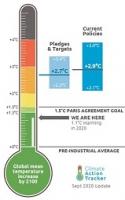Carbon Offsetting - a Rotary Way.
Can we find an effective way of offsetting our ‘Carbon Footprints’, either as individuals or as clubs?

Carbon Offsetting is not the same as Carbon Trading, which can be a contentious issue; many people argue that Carbon Trading is just a way for large organisations to buy their way out of the responsibility of reducing their CO2 emissions. Carbon Offsetting works differently, enabling us to compensate for our emissions by sponsoring activities which directly reduce CO2 emissions somewhere else by a comparable amount.
The Rotary Club of Danetre, Daventry is promoting this project to help clubs and their members to achieve a meaningful offset, or compensation, for their CO2 emissions. You might be surprised to know that the average ‘carbon footprint’ in Britain is 8 tonnes per person per annum. We are working with a UK charity, Solar Aid, to help offset our emissions by encouraging the use of solar rechargeable lamps to replace kerosene lanterns in various places.
In sub-Saharan Africa, 590 million people live without access to mains electricity. Often there is no alternative for these people than to use kerosene lanterns, candles, or even open fires to provide light once the sun goes down. These light sources produce CO2 emissions; are a cause of risks to health, responsible for respiratory diseases resulting from pollution; create the risk of fire and and involve the cost of buying fuel where often earnings are only about $2 a day.
So how does this project work? Offsetting CO2 emissions is achieved by making a relatively small contribution to the project, which then enables solar powered lamps to be provided to a specific community in the target region in Africa. The lamps are not simply donated; they are supplied as part of a Social Enterprise which is run by Solar Aid, called Sunny Money, which enables the proceeds from use of the lamps to be re-invested in the ongoing work.
It's a simple three-stage process;
1. Identify your CO2 output, or Carbon Footprint, with an online tool such as; https://www.carbonfootprint.com.
2. Decide how much you want to offset – maybe all of it?
3. Make a contribution of the identified amount to RCoDD’s project fund.
Why contribute to our club’s project? The answer is simply our relationship with Solar Aid, where economies of scale will maximise the effectiveness of donations. Contributions via their own website are equally valid, but we have identified two of their programmes which we can support in particular ways, either as individuals to fulfil our Environmental responsibilities, or as clubs to fulfil International project aims. You will be able to identify where your money is being used, principally in Malawi.
As an individual your CO2 footprint will be easy to assess and offset. Your contribution will then give several persons, or families, access to solar powered lamps, allowing the users to study in the evening, to carry on commercial activities, to avoid dangerous accidents, to provide medical assistance etc. Using the solar lamps in place of kerosene lanterns or candles will save CO2 emissions as explained below.
As a club you can still use the tool to assess your collective CO2 footprint for an activity or aspect of your work as a club, which will almost certainly be larger than as individuals. A contribution of £100 or more to offset this will provide a solar home lighting system to a family and their home. The home lighting systems cost £100 each and provide a rooftop solar panel, a storage battery and three LED lamps together with the facility to charge mobile phones etc.
A good example for a club might be the following. Driving your car 4000 miles will produce one tonne of CO2. If your club has 20 members who attend, say, 40 meetings a year and have to drive 10 miles to attend each meeting, the total mileage is 8000 miles per year, i.e. 2 tonnes CO2, so a contribution of £ 25 could offset a year's worth of your club’s emissions. There will be lots of other ways you can account for your club's emissions, as well.
Kerosene lanterns produce up to 50 kg CO2 equivalent per month. This ‘equivalent’ is a mixture of CO2 and ‘black carbon’ (or soot) which has a considerable global warming effect in addition to the CO2 gas.
The warranty life of the solar lamps is 3 years. Over this time a kerosene lantern emits up to1800kg of CO2e (equivalent). The cost of supplying each solar lamp to replace the kerosene lantern is £15, so a donation of this sum will offset the emissions of , say, 1300kg CO2e. At a rate of £11.50 per tonne of CO2e offset, this compares well with schemes for offsetting offered by the likes of carbonfootprint.com, Treekly, and Ecologi. (Figures from Global Off-Grid Lighting Association). https://solar-aid.org.
Why not consider offsetting your carbon footprint now? From a Rotary Environmental point of view we are encouraged to be ‘net zero’ as individuals, and this way it’s easy. For most of us a donation of £100 can offset more than your likely CO2 emissions for a full year. And when your club is considering International projects to support, the option to contribute to the ‘Light a Village’ programme can not only offset CO2 emissions, but as well can help meet most of Rotary’s Seven Areas of Focus.
Make a donation to offset your carbon emissions here; https://www.rotary-ribi.org/clubs/page.php?PgID=905832&ClubID=1813 or click the 'SoL Malawi' link.
A key principle of RCoDD’s project initiatives is to keep all our partner donors informed and up to date, so you will know where and how your contributions are used and the benefits which accrue from them.
For more information visit SolarAid's website at; https://www.solar-aid.org.
 Contact Robert Leaper about this page:
Contact Robert Leaper about this page:
Related pages...

Daventry Young Environmentalist Competition
more Danetre Rotary are setting up a Young Environmentalist Competition.
.jpg)
Litter Picking
more The Daventry Town Councils Litter Pick got under way with the help of Danetre Daventry Rotary Club.

Pond Creation
more Danetre Rotary have been looking for an Environment Project and are currently investigating the creation of a new wildlife pond.
Environment Policy
more With the Environment becoming a bigger and bigger issue Danetre Rotary have come up with a policy and you can read it here.
back to page above this...

Environment
back Rotary the World over have adopted the Environment as a 7th area of Focus. Watch out for events to save the Environment.